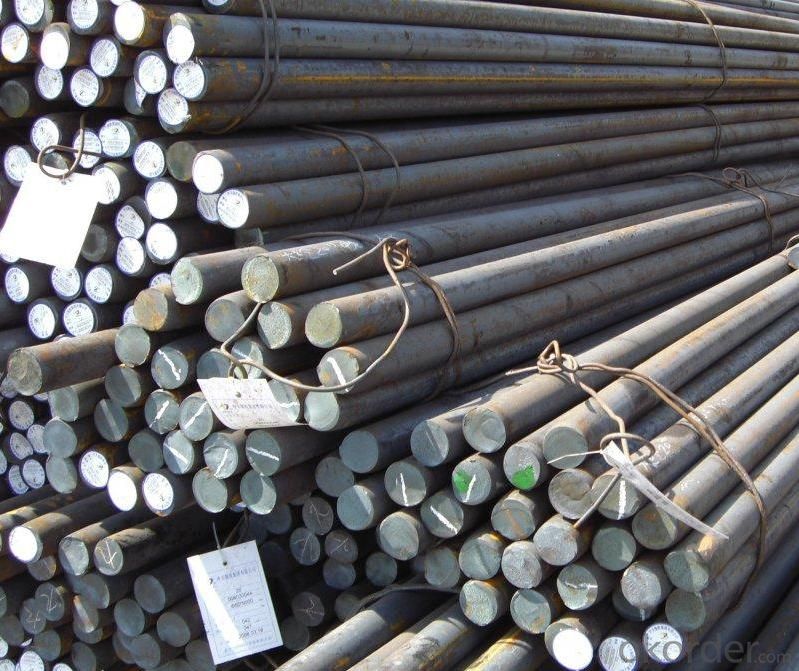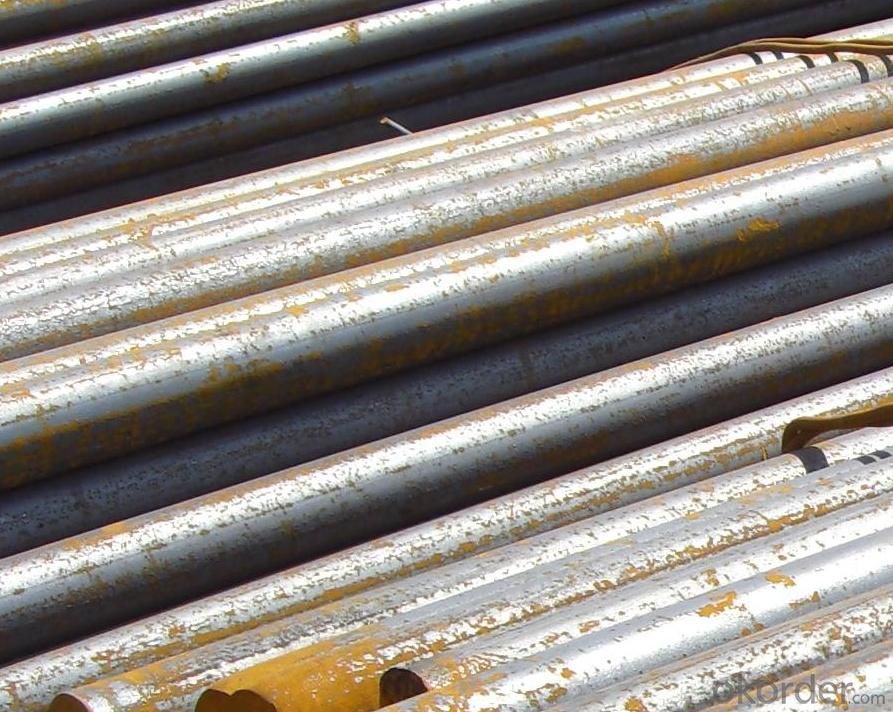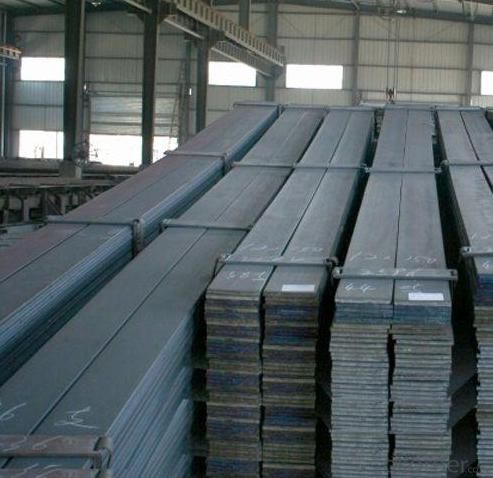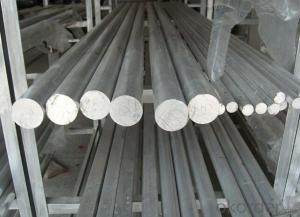20Cr Steel Round Bar SAE520 Steel Round Bar
- Loading Port:
- Tianjin
- Payment Terms:
- TT OR LC
- Min Order Qty:
- 25 m.t.
- Supply Capability:
- 50000 m.t./month
OKorder Service Pledge
OKorder Financial Service
You Might Also Like
Item specifice
20Cr Steel Round Bar SAE520 Steel Round Bar
Product Description:
1.Standard:40Cr,20Cr, 40CrMo4,SCM440,AISI4140, etc.
2.Diameter:25mm-450mm
3.Length:5.8/6m-12m or as required
4.Application:re-manufacture, structural steel etc.
5.Certificates:ISO9001:2008,ISO14001:2004,OHSAS18001
6.Packing: In bundles,Standard export sea-worthy packing or as customer's requirement
7.Shipment: by bulk or by container
8.Quality Contation
Both end of each bar must be cut.
Ladle furnanced and vacuum de-gassed
Show heat No. on each bar
Surface condition the surface of the hot rolled square bar shall befree cracks, scar and wrinkles that affect the use of the
billets. In case there is the above-mentioned defect, it shall be remove.
The mill test certificate shall show the chemical composition, and it is guaranteed that the chemical composition shall be
within the limit stipulated in the contract.
Chemical composition:
Grade | C | Si | Mn | Cr |
20Cr | 0.18-0.24 | 0.17-0.37 | 0.5-0.8 | 0.7-0.9 |
Specification:
OD | Length | Material | Standard | Technique |
16-260mm | 6-12m or aques per request | 20# | GB ASTM DIN | Hot rolled |
16-350mm | 45# | |||
200-500mm | 45# | Forged | ||
20-250mm | 20Cr,40Cr,20-42CrMo | Hot rolled | ||
50-300mm | GCr15 |
Application:
Hot rolled alloy structure steel round bar are widely used in machinery making, autombile making, railway, mine machinery, petoleum machinry, agricultural machinery and civil archtectue such as all kinds of shafts, screws, connecting rods, hardware tools, gears, standard parts, spanners fasteners, structural parts for automobile and agricultural machinery, outer and iner sleeves, rollers and balls for bearing making.
Product Show:



- Q:How does special steel contribute to the defense aerospace industry?
- Special steel contributes to the defense aerospace industry by providing high-strength, lightweight, and corrosion-resistant materials for the construction of critical components such as aircraft frames, landing gear, and engine parts. These steels are specifically designed to withstand extreme conditions, including high temperatures and pressures, ensuring the safety and reliability of military aircraft. Additionally, special steel's superior mechanical properties enhance fuel efficiency, increase payload capacity, and improve overall performance, making it an essential material in the defense aerospace sector.
- Q:What are the main factors affecting the toughness of special steel?
- The toughness of special steel is influenced by several main factors, namely its composition, microstructure, and heat treatment. Composition is a key determinant of toughness, as certain alloying elements like chromium, molybdenum, nickel, and vanadium can enhance the steel's toughness by forming solid solutions or precipitates that impede crack propagation and improve fracture resistance. Microstructure also plays a significant role in determining toughness. The size, shape, and distribution of different phases in the steel, such as ferrite, pearlite, bainite, and martensite, impact its toughness. Fine-grained microstructures generally exhibit higher toughness due to their increased resistance to crack propagation. Heat treatment is another essential factor for controlling toughness. By subjecting the steel to heating and cooling processes, its microstructure can be altered, thereby affecting toughness. Common heat treatments like quenching, tempering, and annealing are employed to enhance steel toughness. For instance, quenching and tempering can produce a microstructure that possesses a desirable balance of hardness and toughness. Additional factors that can influence toughness include the presence of impurities, non-metallic inclusions, and residual stresses. Impurities and inclusions can act as stress concentrators, reducing the steel's toughness. Furthermore, residual stresses, which may arise during manufacturing, can create regions of high stress that initiate crack formation and impact toughness. In conclusion, the factors of composition, microstructure, heat treatment, impurities and inclusions, and residual stresses are crucial in determining the toughness of special steel. Understanding and controlling these factors are vital for optimizing the toughness and performance of special steels in various applications.
- Q:How are aluminum alloys used in the automotive industry?
- Aluminum alloys are extensively used in the automotive industry due to their lightweight, high strength, and corrosion-resistant properties. These alloys are commonly utilized in the manufacturing of various components, such as engine blocks, cylinder heads, wheels, and body panels. By incorporating aluminum alloys, vehicles can achieve improved fuel efficiency, better performance, and enhanced safety while reducing overall weight and emissions.
- Q:How does special steel perform in high-pressure hydrogen environments?
- Special steel performs well in high-pressure hydrogen environments due to its high strength, corrosion resistance, and ability to withstand hydrogen embrittlement. It is designed to handle the extreme conditions associated with hydrogen, such as high temperatures and pressures, without compromising its structural integrity. Additionally, special steel alloys are often used in hydrogen storage systems, pipelines, and fuel cell components, demonstrating their reliability and effectiveness in such environments.
- Q:What are the main applications of special steel in the packaging machinery?
- Special steel is widely used in packaging machinery due to its outstanding properties such as high strength, corrosion resistance, and durability. It is primarily utilized in the construction of machine components like blades, dies, and molds, ensuring efficient and precise cutting, shaping, and forming of packaging materials. Additionally, special steel's ability to withstand high temperatures and extreme pressures make it suitable for applications requiring heat sealing or sterilization of packaging. Overall, special steel plays a crucial role in enhancing the performance, reliability, and longevity of packaging machinery.
- Q:What are the different tempering techniques used for special steel?
- There are several tempering techniques used for special steel, including air tempering, oil tempering, water tempering, and salt bath tempering. Each technique involves heating the steel to a specific temperature and then cooling it at a controlled rate to achieve desired hardness, strength, and other mechanical properties.
- Q:What are the properties of corrosion-resistant tool steel?
- Corrosion-resistant tool steel possesses a combination of properties that make it resistant to corrosion. These properties include high levels of chromium, which forms a protective oxide layer on the surface of the steel, preventing the penetration of corrosive substances. Additionally, corrosion-resistant tool steel often contains other alloying elements such as molybdenum, vanadium, and tungsten, which further enhance its resistance to corrosion. This type of steel also exhibits high hardness, strength, and wear resistance, making it suitable for use in various tools and applications where corrosion resistance is crucial.
- Q:Can special steel be used in the packaging industry?
- Yes, special steel can be used in the packaging industry. Special steel alloys, such as stainless steel, offer excellent durability, corrosion resistance, and strength, making them suitable for manufacturing packaging materials and machinery. They are commonly used in producing containers, drums, cans, and machinery components for packaging applications.
- Q:What is the role of special steel in the manufacturing of precision instruments?
- Special steel plays a crucial role in the manufacturing of precision instruments. Precision instruments, such as watches, surgical instruments, measuring tools, and aerospace components, require materials that possess exceptional qualities like durability, strength, corrosion resistance, and dimensional stability. Special steel, with its unique composition and properties, is specifically engineered to meet these demanding requirements. One of the key advantages of special steel is its high level of purity and uniformity. It undergoes extensive refining and purification processes to remove impurities, ensuring consistent and reliable performance. This purity is essential in precision instruments as it minimizes the risk of contamination, which could lead to inaccuracies or failures in their functioning. Another vital characteristic of special steel is its exceptional strength and hardness. Precision instruments often need to withstand high levels of stress, pressure, or mechanical forces without deforming or failing. Special steel, with its superior strength, provides the necessary structural integrity and stability to these instruments, allowing them to maintain their accuracy and reliability over time. Moreover, special steel exhibits excellent corrosion resistance, which is crucial for precision instruments that may come into contact with moisture, chemicals, or other corrosive substances. Corrosion can deteriorate the surface finish and compromise the functionality of the instruments. Special steel's resistance to corrosion ensures that the instruments can withstand harsh environments and continue to perform accurately. In addition to its physical properties, special steel is highly machinable and can be shaped into complex and intricate components with tight tolerances. Precision instruments often require intricate designs and intricate parts that demand high precision in their manufacturing process. Special steel's machinability allows for the production of these complex components with utmost precision, ensuring the overall accuracy and functionality of the instruments. In summary, the role of special steel in the manufacturing of precision instruments is vital. Its purity, strength, corrosion resistance, and machinability make it an ideal material for producing high-quality instruments that can deliver precise measurements, withstand demanding conditions, and maintain their accuracy over time. Without special steel, the production of precision instruments with such exceptional qualities would be significantly compromised.
- Q:How does special steel perform in terms of corrosion resistance in acidic environments?
- Special steel, such as stainless steel, exhibits excellent corrosion resistance in acidic environments due to its high chromium content. The chromium forms a protective oxide layer on the surface of the steel, preventing the corrosive attack of acids. This makes special steel a reliable choice for applications where exposure to acidic environments is a concern.
1. Manufacturer Overview |
|
|---|---|
| Location | |
| Year Established | |
| Annual Output Value | |
| Main Markets | |
| Company Certifications | |
2. Manufacturer Certificates |
|
|---|---|
| a) Certification Name | |
| Range | |
| Reference | |
| Validity Period | |
3. Manufacturer Capability |
|
|---|---|
| a)Trade Capacity | |
| Nearest Port | |
| Export Percentage | |
| No.of Employees in Trade Department | |
| Language Spoken: | |
| b)Factory Information | |
| Factory Size: | |
| No. of Production Lines | |
| Contract Manufacturing | |
| Product Price Range | |
Send your message to us
20Cr Steel Round Bar SAE520 Steel Round Bar
- Loading Port:
- Tianjin
- Payment Terms:
- TT OR LC
- Min Order Qty:
- 25 m.t.
- Supply Capability:
- 50000 m.t./month
OKorder Service Pledge
OKorder Financial Service
Similar products
New products
Hot products
Hot Searches
Related keywords






























